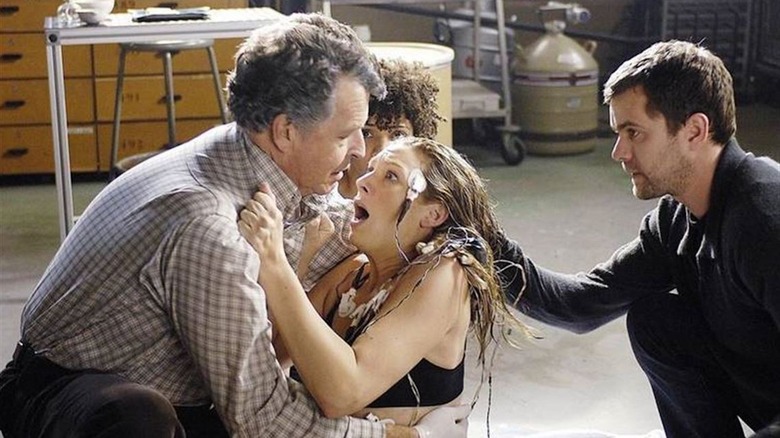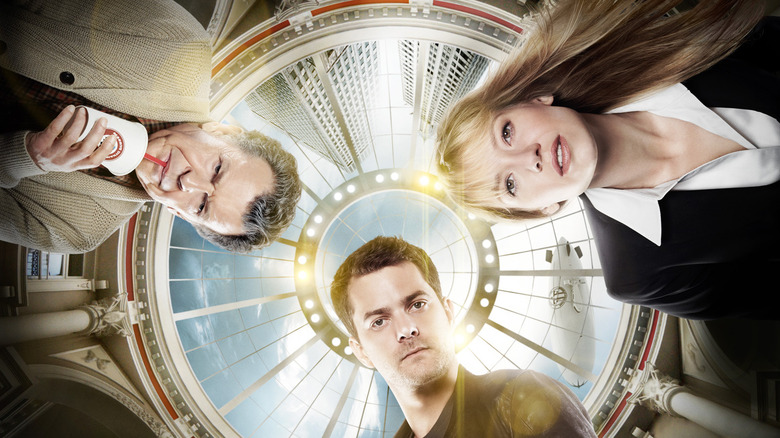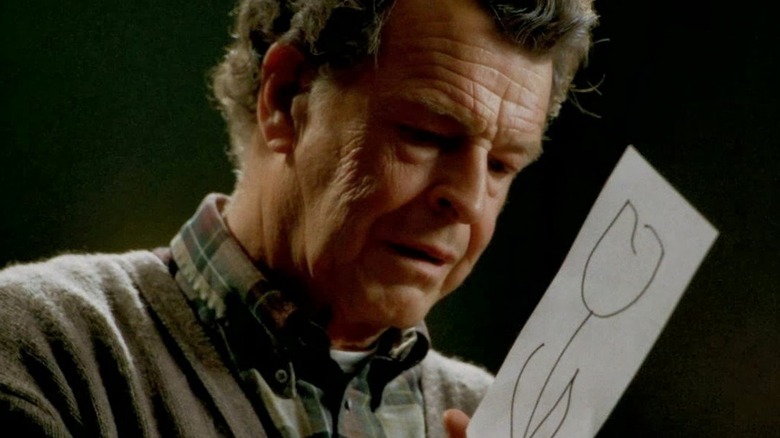
(Welcome to The Daily Stream, an ongoing series in which the /Film team shares what they've been watching, why it's worth checking out, and where you can stream it.)
The Series: "Fringe"
Where You Can Stream It: HBO Max
The Pitch: After a run-in with a strange phenomenon involving her former partner and a case of transparent skin, FBI Agent Olivia Dunham (Anna Torv) is assigned by her boss Phillip Broyles (Lance Reddick) to the bureau's special Fringe Division, which investigates unusual crimes and occurrences — usually connected to the paranormal. With the help of the slightly mad scientist Dr. Walter Bishop (John Noble), his acerbic son Peter (Joshua Jackson), and unwitting assistant FBI Junior Agent Astrid Farnsworth (Jasika Nicole), Olivia Dunham investigates cases related to fringe science, from time travel, to spontaneous combustion, to flesh-eating parasites, to parallel worlds. All the while, the team is watched silently by a group of bald, pale white men called "the Observers."
Why It's Essential Viewing

"Fringe" came at the tail end of the "Lost" pop culture domination, and had the benefit — or maybe the burden — of being a J.J. Abrams/Bad Robot production. Created by Abrams, Alex Kurtzman, and Roberto Orci, "Fringe" certainly looked like "Lost" by way of an "X-Files" knock-off, and, for the first season at least, was not as interesting as either. It was a procedural with occasional shocks of body horror (people's skin fell off! Giant bugs burst out of people's mouths! Bodies merged with other bodies and collapsed in a pool of blood!) but felt frustratingly restrained by its procedural format and that dang mystery-box storytelling that plagued everything Abrams touched. But then, in its season 1 finale, something miraculous happened: "Fringe" became good. Not just good, it became frequently great sci-fi TV.
Without going into spoilers, because this is an article trying to convince you to watch what I think is still a sorely overlooked sci-fi show, with its season 1 finale, "Fringe" dramatically opened up its world(s). All right, I'll say it, yes, it became about parallel worlds. And in introducing the concept of parallel worlds and shedding any semblance of being an easily accessible procedural show (suck it normies!), "Fringe" became much more daring, much weirder, and much more interesting. That season-long mystery of some sinister "Pattern" that was manipulating things behind the scenes and producing the cases that Olivia and co. would investigate? Dropped in favor of a parallel world war. The primary narrative of an FBI agent trying to expose a shadowy corporation? Actually, it's about how a father's grief caused him to accidentally break the time-space continuum. Basically, "Fringe" stopped trying to appeal to the masses and embraced being a weirdo cult sci-fi show.
Show Of Science, Show Of Faith

It's fascinating to watch "Fringe" from the beginning and see it struggle between being a new-age "X-Files" and giving into its pulpy sci-fi tendencies. Thankfully, the latter happened, and while "Fringe" remained an episodic series, it gave itself more freedom narratively than just "FBI agent investigates weird paranormal case, and maybe some shady corporation is involved." This episode, everyone takes LSD and suddenly it's a musical. Or this episode, Olivia battles her doppelganger and gets bangs! Or this episode, we go back to the '80s!
And while I have an affection for that rip-roaring final season where it went all-out "sci-fi apocalyptic thriller," my favorite version of "Fringe" was when it walked that fine line between procedural and pulp. In those episodes, "Fringe" would prove the power of episodic storytelling and the timelessness of mixing sci-fi and emotion. And in those episodes, "Fringe" reached a kind of philosophical height that it rarely did (though it might have some of the finest genre performances in modern TV thanks to John Noble's alternately fragile, steely, flawed, and warm turn as all-time great sci-fi character Walter Bishop) just because it's so busy bloodying up bodies. I'm talking of the best "Fringe" episode, "White Tulip." The season 2 episode is one of my favorite hours of sci-fi TV, not only because it presents a time-loop story by way of a love story, but because it dares to answer the questions that "Lost" asked. Science or faith?
The episode's "villain" of the episode answers, "Walter, God is science. God is polio and flu vaccines and MRI machines, and artificial hearts. If you are a man of science, then that's the only faith we need." But in "White Tulip," Walter asks for absolution where he knows he won't get it, and the episode — miraculously — leaves space for faith, even when the show so firmly lands in the science camp.
That's where "Fringe" lands: this weirdo, pulp sci-fi show with occasional bursts of violence and occasional nuggets of wisdom. It's a procedural that transformed into something weirder, and while it may not necessarily be airtight (sorry Ben Wyatt), it's still darn good sci-fi TV.
Read this next: The Daily Stream: Your Name Is A Love Story For The Ages
The post The Daily Stream: Time to Watch Fringe and Find, as You Suspected, Airtight Sci-Fi TV appeared first on /Film.
0 Commentaires